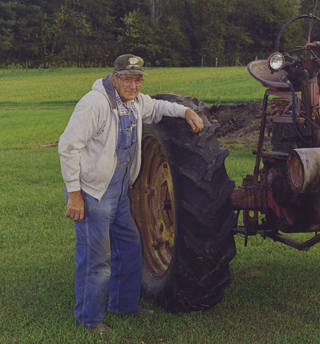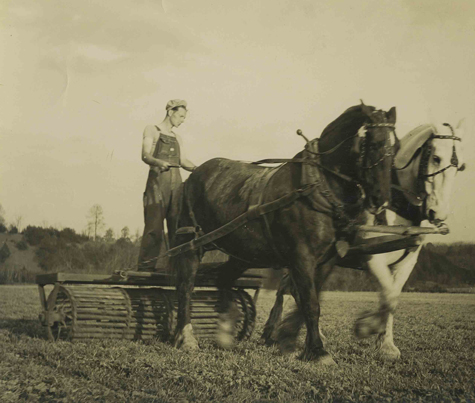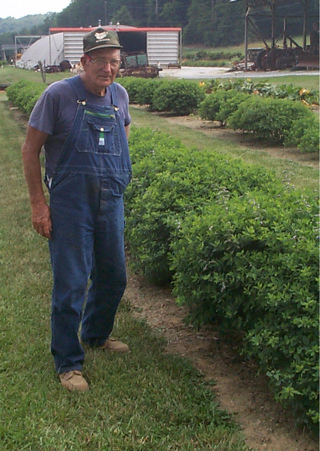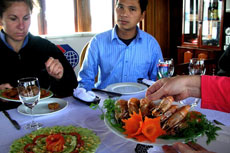Human Flower Project
Singing through the Soil
Allen Bush pays homage to one of his mentors—a Western North Carolina farmer who orchestrated crops and equipment, and sang gospel music, too.

Paul McKinney and his trusty 1949 Farmall tractor
Photo: Paula McKinney
By Allen Bush
Up Avery’s Creek and around Mills River in the North Carolina mountains, between Asheville and Hendersonville, folks love Paul McKinney. He is a good man, a remarkable man. He and his wife, Mary, own McKinney’s Small Fruits and have been partners in love for fifty-nine years. Paul is old school though not old-fashioned, except for his customary overalls. He stands tall, over six feet, a wise, handsome man who shakes hands as firmly as he strung barbed wire.
I lived a half-mile down the road from the McKinneys between 1979 and 1995. Paul came down to introduce himself soon after I arrived. It was the neighborly thing to do. I had bought 37 acres and started Holbrook Farm, named after my mother’s side of the family. They had come from Trap Hill, a few ridgetops away in Wilkes County. My retail mail-order nursery published a spring and fall catalog and shipped rare and unusual perennials across the country for fifteen years. I moved to the farm from Louisville, Kentucky, after a year’s training at the Royal Botanic Gardens at Kew, England. The summers were cooler and the winters milder in western North Carolina. I was a suburban boy turned nurseryman, full of myself, but actually not quite sure what I’d gotten myself into.
Mr. McKinney worshiped Jesus, loved his family and made no pretense. He drew no distinction between sinners and the saved. He was fair to everyone, especially his newly arrived, suspect, bearded neighbor. I was young, had some backing – the support of a family and new wife – and fell into the might-be-saved-someday category. Paul and Mary McKinney had bought a small place up the road, two years before I arrived. They had little financial backing but never lacked for loving family or devoted friends.

A young Paul McKinney working a field with draft horses
Photo: Courtesy of Enka Voice
The McKinneys began their marriage on an 800 acre farm that Paul and his father sharecropped a few miles away on Avery’s Creek. After the Second World War father and son made a gentleman’s agreement with the landowner to turn forest into farm. Stump by stump they cleared land, nurtured their homestead and made a living for three daughters and a son. Over time, it was understood, the land would grow more productive, farm profits would be shared and the land would eventually become the McKinneys’. Paul says the landowner promised, “If we make it, the land will be yours.” He died thirty years later. His wife and son followed in quick succession. All bets were off. A handshake so long ago meant nothing this far down the chain. This mountain farm, so much a part of the McKinneys’ lives, was sold from underneath them.
Paul, then, fifty-three, downsized. He bought six and one-half acres on Fanning Bridge Road. The McKinneys were not going to be caught short again. He put-up a pole barn for farm machinery and a shed for a milk cow.
He took “public work,” as he called it, for the first time. Paul took a job a mile away at the North Carolina Mountain Horticultural Crops Station doing farm and maintenance work. At the end of the day he came home to work until the daylight dwindled. Paul, it could be easily said, “traded his bed for a lantern.” He and Mary tended strawberries, blueberries and blackberries that they sold pick-your-own, and vegetables that they canned and froze for themselves. He had some fine equipment stuffed inside the open-sided pole barn, but nothing he loved more than the Farmall that had been his first tractor, bought in 1949.
 McKinney could grow anything, and did—shown here with a row Baptisia pendula
McKinney could grow anything, and did—shown here with a row Baptisia pendula
Photo: Allen Bush
Paul grew corn and cut hay on farm land he leased all around Henderson and Buncombe County but he looked forward to coming home. He loved his new place. There was never any hint at bitterness over the loss of the bigger farm on Avery’s Creek. Paul was peculiarly magnanimous in his outlook: life’s ebb and flow evens-out over a long, blessed life.
Strawberries and stokesias were grown to perfection by an artist in harmony with crops and equipment. Seeds of Stokes’ aster and baptisia were contract grown for Jelitto Perennial Seeds. I envied Paul’s practical skills. I had none. My father once said that, tools in hand, I was “like a bear with boxing gloves on.” (Paul McKinney astounded me with his know-how. He once poured Coca-Cola on a rusted chain and untangled frozen metal.)
Paul loved to sing gospel music. He and Mary never traveled far but they began going a day’s distance to meet other folks who enjoyed singing. And sometimes the group came to the McKinneys.’ They would gather to sing on the back porch after supper, surrounded by the majesty of this small place. You could hear Paul’s magnificent, deep voice down the road.


Seems like a *hand*shake should be meaningful in farm country. Glad it worked out for Paul and Mary on Fanning Bridge Road.